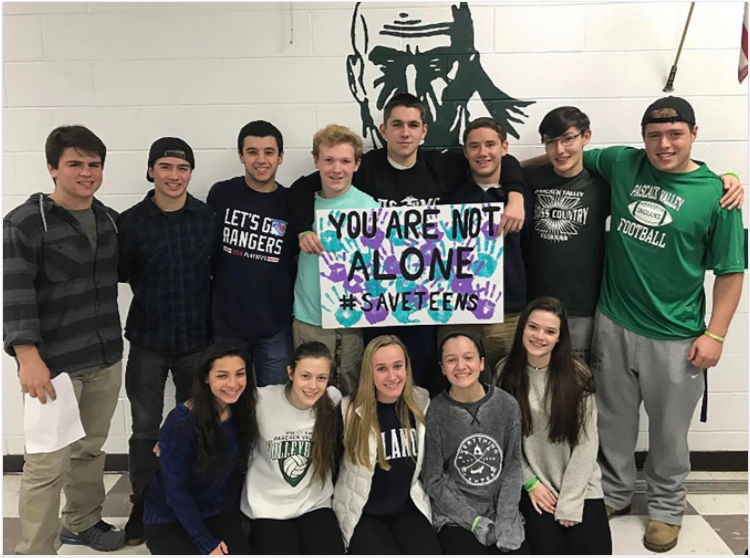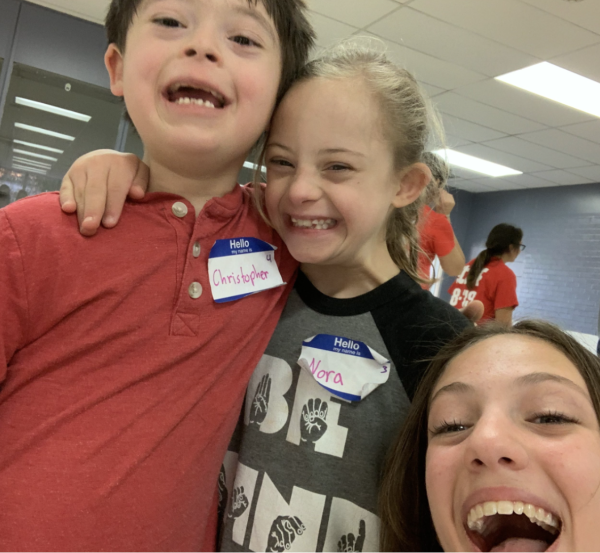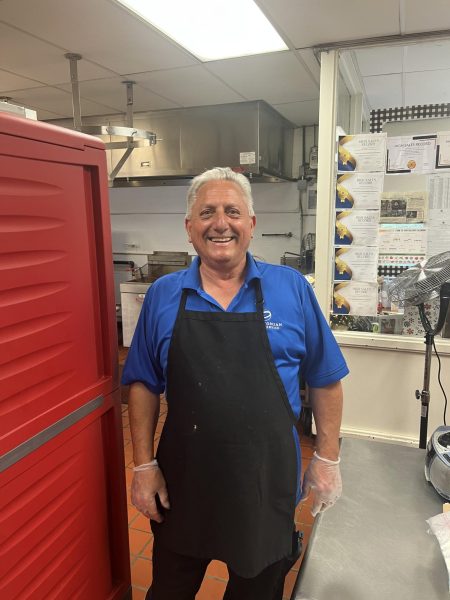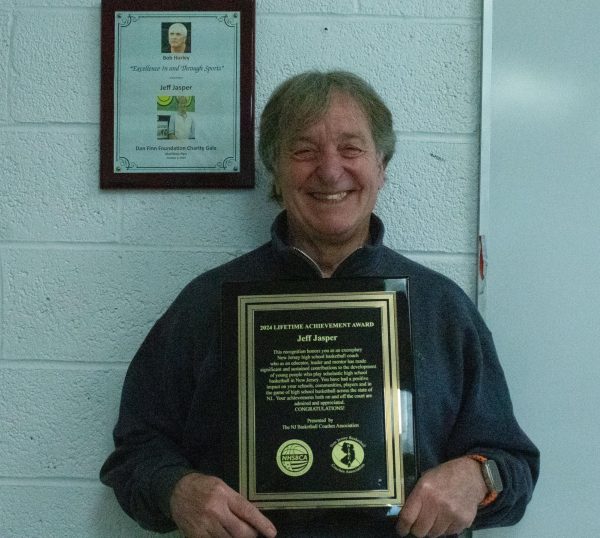PV alumni reflect on journey following suicide of classmate
PV alum Jaclyn Spellman (bottom left) and members of the class of 2017 got together to promote suicide awareness after a classmate took his own life. “I think that if everyone would take the step to be open, and everyone could have conversations like that, it would help break the stigma,” Spellman said.
(Editor’s Note: This article discusses topics of depression and the suicide of a former Pascack Valley student. If you are experiencing symptoms of any mental illness, please speak to a doctor, family, and friends. If you are experiencing suicidal thoughts, call the suicide hotline, 1-800-273-8255, immediately. This article was intended to be published during Sept. for Suicide Awareness Month, but due to various editorial setbacks we decided to publish it in Nov.)
Content Warning: Mentions of Suicide and Depression
Throughout high school, Jaclyn Spellman felt depressed, but she never told anyone.
“I kind of always knew that I was depressed, all throughout high school,” Spellman said. “I was very scared to talk to my parents or any of my friends about it because I thought it was really weird.”
Her classmates noticed she was acting differently. Spellman said that she slept more than usual, stopped talking to her family, viewed everything negatively, and wanted to be in her room all the time. People would point it out, but she always denied it. She was embarrassed about how she was feeling, but that would all change after facing a heartbreaking situation.
Spellman built up the courage and finally asked her parents if she could see a therapist. From there, she was diagnosed with depression and is currently on antidepressant medication.
To this day, she attends therapy.
Spellman explained that as well as helping her with her mental health, therapy helped her become more open about her struggles and an overall nicer person.
As this year’s Suicide Prevention Month passed by in Sept., Spellman is one of many from the Class of 2017 whose lives were forever impacted when a classmate took his own life in Nov. of their senior year.
Spellman and her classmates Jack Williams and Andrew Merli found themselves confronted with an issue that they never thought they would experience.
Spellman, Williams, and Merli were all close friends with the classmate. They all said that his sense of humor was “one of a kind”, and he was a charismatic and friendly guy.
When Merli was asked if his friend showed any signs of suicidal thoughts, he said he did not notice them at the time.
“I didn’t think twice about him having suicidal thoughts,” Merli said, who is finishing his last year at Rutgers University. “But after he died, I realized there were definitely some minuscule details that stuck out after.”
Merli, Williams, and Spellman found it very comforting to be around friends during these awful times.
“I just found it was really important to be around people I cared about, whether that be my friends or family,” Williams said. “We really came together and tried to be there and support each other.”
Williams said that the following weeks felt fuzzy; he felt hollow and it was hard for weeks, months, and years after. Merli’s mentality shifted for the rest of his life, and for about a week he felt as if he couldn’t bring himself to do anything.
Merli, Williams, and Spellman said that they still think about him every day.
Merli explained that he never truly “got over” his classmate’s death, and Williams, who recently graduated from Quinnipiac University with a pre-law and political science degree, said that he passes the cemetery where his friend was buried every day on his way to work and that sometimes his death still doesn’t feel real.
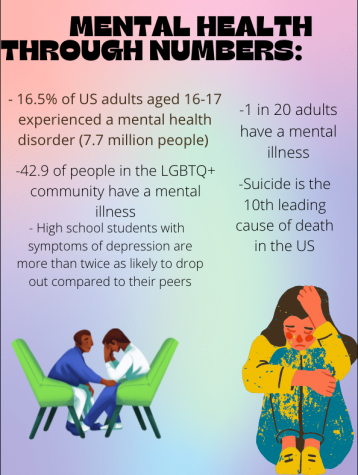
According to Centra Care, freely talking about mental health can help people feel less shameful.
The shame some may feel regarding mental health may cause individuals to not reach out for help. People are scared to open up causing their problems to be dealt with on their own.
Some mental health experts say that people with mental health issues are “dangerous, a threat to society, and are untreatable.”
This statement is not true.
“Talking to my friends openly about my mental health and therapy can help break the stigma,” Spellman said. “People treat it as an abnormal conversation but mental health is just as important as physical health.”
It is our job to break the stigma.
Spellman says we can help individuals open up about their mental health by openly talking about it in our day-to-day conversations. Spellman and her friends often talk about their mental health, what they discussed in therapy, or how they are feeling.
“I think that if everyone would take the step to be open, and everyone could have conversations like that, it would help break the stigma,” Spellman said.
Williams, Merli, and Spellman all said they realized how important it is to check up on their loved ones and that their minds opened up about mental health after the passing.
Williams was a peer leader his junior and senior year and spoke to the freshman class about the topics of suicide and mental health.
Spellman was the president of a mental health club on her campus, worked for a mental health hotline, and worked as a peer educator where she talked to students about sexual health, mental health, and alcohol and drug usage.
Spellman graduated from The University of Maryland with a Bachelor of Arts in psychology. She is currently working as a special education aid but is interested in being a guidance counselor for children, a therapist, or working in the mental health department. The death of her friend made her realize how important the topic of mental health is and opened her mind to the field.
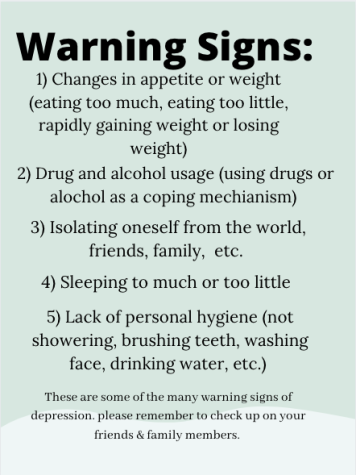
Remember to check up on your loved ones no matter how happy they may seem, they could be struggling. A simple, “Hey, how are you doing?” never hurts.
If you notice your friends or family seem “off” or different than they usually appear, remember to check up on them and make sure they are okay.
Please speak to a therapist or doctor if you are experiencing symptoms of depression or other mental illnesses. As well as speaking to a doctor, there are hotlines you can call, numbers you can text, and apps you can download.
Please remember that depression is treatable, and things can get better.
Call 800-273-8255 if you need immediate help.
When Williams was asked what he would say to a kid who is struggling with depression, his response was:
“Things may seem hopeless at the moment but there are always brighter days ahead and things will get better. Even if it may not seem like it, people are there for you. There’s always someone that’s willing to listen or will get you help. Some people get clouded and may not always think right but people need to know that there are always better options out there.”

